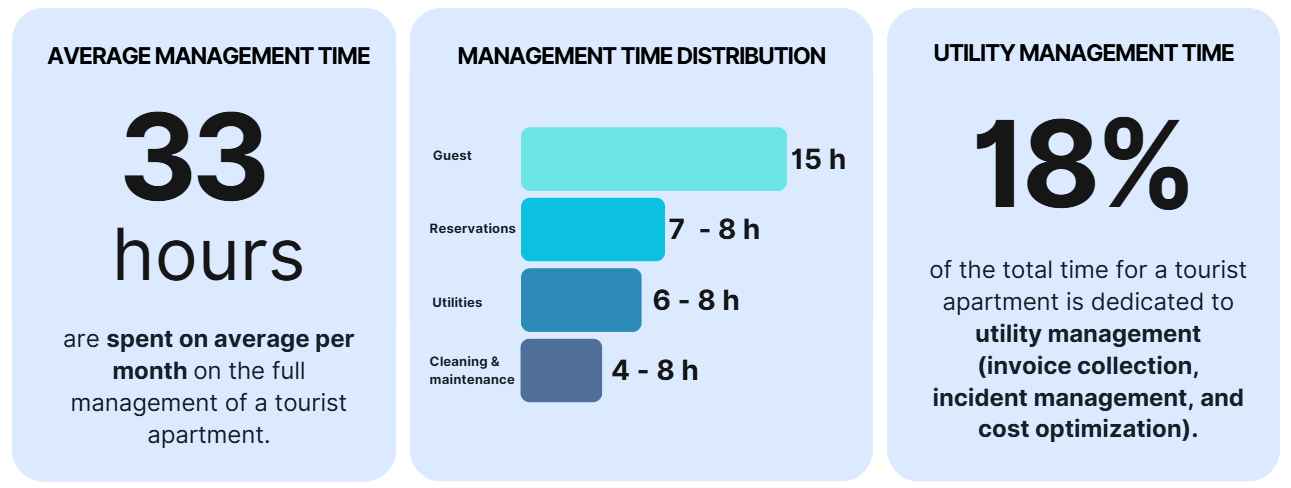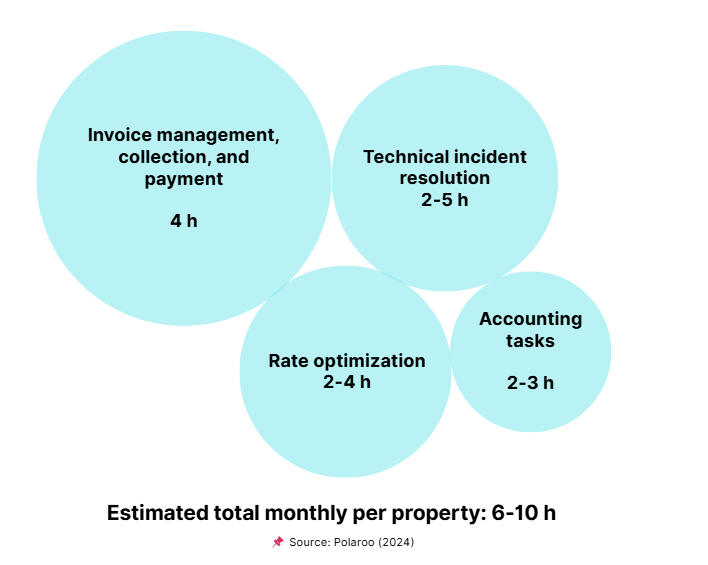How much time does your profitability cost? Efficient STR management in 2025


Vacation rental profitability depends not only on how much you earn, but also on the time and effort you invest to achieve it. Automating key tasks, such as utility management with tools like Polaroo, can reduce costs, free up hours, and truly scale efficiency.
In the vacation rental sector, profitability depends not only on nightly income but also on the time and effort required to generate each euro. The more properties you manage, the more important operational efficiency becomes.
In this blog, we analyze how much time it really takes to manage a short-term rental property (STR), which tasks are the most critical, and how to optimize resources through technology, automation, and smart outsourcing.
According to our study, an average of between 33 and 56 hours per month is spent managing each tourist property, but this figure can increase significantly—up to 80 hours per month during peak season.

The breakdown of management time reveals where the greatest efforts are concentrated:
The time spent can vary depending on location, supplier efficiency, the number of utilities managed, and the effectiveness of existing processes. Using automation systems and property management tools can significantly reduce this time.
Below is a breakdown of the main activities involved in operating an STR, their estimated monthly time, and key details for each:
With high automation (self-check-in, channel managers, management software, scheduled messages, etc.) and standardized processes, it is possible to reduce up to 50% of the operational workload of an STR.
As the number of STRs managed increases, many administrative and operational tasks benefit from economies of scale, allowing for greater efficiency in processes such as invoicing, booking management, or price updates.
Other activities such as cleaning, supplier coordination, or incident handling tend to scale proportionally, as they directly depend on the number of stays and individual property maintenance needs. This is why it is essential to analyze in detail which tasks consume the most time and which provide less direct value to the guest.
This segmentation allows managers to focus resources on what truly makes a difference in the guest experience, while identifying opportunities for automation or outsourcing that reduce costs without compromising service quality.
One of the most underestimated yet critical tasks is the management of basic utilities (electricity, gas, water, internet). Although it may seem simple, this activity consumes more time than expected—especially when managing multiple properties.

This estimate is based on manual process management and can increase significantly when:
Automating utility management and centralizing invoice information can free up a manager’s time, optimize resources, and scale the profitability of each tourist property.
Platforms like Polaroo allow for the complete outsourcing of utility management, saving both time and operating costs. By centralizing all basic services into a single dashboard, managers reduce operational workload and administrative errors.
One of the biggest challenges in managing an STR is operational fragmentation: multiple utility suppliers, manual processes for collecting and verifying invoices, repetitive accounting reconciliations, and lack of visibility into real costs. This fragmentation not only consumes time but also increases the risk of errors, overcharges, and missed savings opportunities.
In this context, tools like Polaroo offer a comprehensive solution that enables:
For managers of one or several STRs, the added value of Polaroo is twofold:
AB Apartment Barcelona, a leading agency managing more than 700 properties, partnered with Polaroo to centralize its utility management—reducing costs, saving time, and improving operational efficiency.
As a result, AB Apartment Barcelona has saved €20,000 and 1,122 hours, achieving 85% efficiency. Carlos Altamirano, from AB Apartment Barcelona’s Accounting Department, notes:
“The use of Polaroo makes it easier for us to calculate utilities and have invoices readily available, avoiding the need to log into each supplier’s portal to download them.”
In such a competitive market, every minute counts. With Polaroo, you can transform the management of your tourist property, freeing up valuable time to focus on what really matters: delivering an exceptional guest experience and growing your business.
Discover how we can help you optimize operations and scale profitability today.
Our service fees pay for themselves with the time and money saved by using Polaroo.